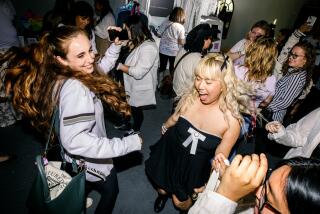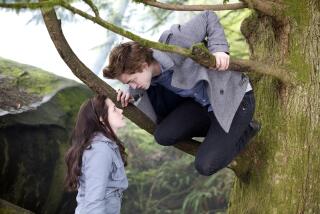When ‘Twilight’ fandom becomes addiction
- Share via
Chrystal Johnson didn’t think there was anything unhealthy about her all-consuming fixation with “The Twilight Saga” — until she discovered it was sucking the life out of her marriage.
“I found poems my husband had written in his journal about how I had fallen for a ‘golden-eyed vampire,’ ” says Johnson, a 31-year-old accountant from Mesa, Ariz., who became so enthralled by the blockbuster series of young adult novels and movies that she found herself staying up all night, re-reading juicy chapters and chatting about casting news and the are-they-or-aren’t-they romance between the stars of the films, Kristen Stewart and Robert Pattinson.
“ ‘Twilight’ was always on my mind, to the point where I couldn’t function,” Johnson says.
Anyone who has ever peeked inside a comic-book convention or gone to a late-night screening of “The Rocky Horror Picture Show” knows that some pop-culture fans aren’t exactly known for their moderation. But there are some key differences distinguishing “Twilight” groupies and their seemingly bottomless obsession from that of other entertainment junkies.
“A lot of fans engage in obsessive behavior, but to the extent that it’s damaging to their offline relationships, that’s pretty uncommon,” says Nancy Baym, associate professor of communication studies at the University of Kansas and author of “Tune In, Log On: Soaps, Fandom and Online Community.” “When you talk about someone getting up at 4 a.m. and sacrificing marriage, that sounds like addictive behavior.”
Like its immortal vampires, “Twilight,” with its archetypal allure of brooding bad boys and forbidden romance, has been able to transcend age, creating devotees (largely women) ranging from tweens to AARP members. Add in the instant access of the Internet, offering 24/7 escape into a “Twilight”-saturated universe, full of tantalizing info-nuggets and a community of like-minded souls, and the result is a growing number of people whose love for the franchise seems to have crossed over from casual to compulsive.
For the latest illustration of “Twilight” mania, look no further than the hundreds of fans who pitched tents and slept outside for days in front of the Nokia Theatre in downtown Los Angeles in hopes of catching a glimpse of one of the stars at Thursday’s red-carpet premiere for “Eclipse,” the latest installment of the franchise, which opens nationwide June 30. “This is the first time I’ve been this passionate about anything,” says Kelli Chavez, a 39-year-old mom who drove in from Sylmar. “I’ve read each of the books at least eight or nine times and I’ve watched each of the movies over 300 times apiece.”
Chavez doesn’t hesitate when asked whether anyone in her life resents her passion for “Twilight.” “My 6-year-old son,” she says soberly. “I definitely need to go to Twilighters Anonymous about it.”
There is a Twilighters Anonymous, but it’s not a 12-step group. Rather, it’s a website for fans who want to feed their habit, not kick it. But an increasing number of confessionals have been popping up on community forums from women concerned about their tendency to neglect important aspects of their daily lives to dip into the fantasy that is Stephenie Meyer’s operatic saga about Bella (Stewart, in the films), a small-town everygirl whose je ne sais quoi mojo attracts the warring affections of a pair of metaphysical hunks: a vampire, Edward (Pattinson), and a werewolf, Jacob ( Taylor Lautner).
Advice portals such as Yahoo Answers have been teeming with desperate-sounding pleas such as, “How to calm my Twilight addiction, help me please!?” Some sites’ chat forums have become makeshift support groups, full of panicked testimonials. “It’s like a drug,” writes one concerned fan with the username Ally. “I have to read it or I break down crying. It’s awful. I don’t want to tell anyone about it. But I fear it’s unhealthy.”
Though it may be characteristically melodramatic of “Twilight” junkies to connect late-night reading jags to a future stint in the Betty Ford Clinic, there’s no doubt that the franchise does not lend itself to casual interest. To know “Twilight” is to love it or to loathe it, with not much room in between. No series of book-to-film adaptations, with the notable exceptions of “The Lord of the Rings” and “ Harry Potter” franchises, has captured the popular imagination with such enduring intensity. Worldwide, “The Twilight Saga” has sold around 100 million books, and the first two movies alone have grossed more than $1.1 billion.
Though “Twilight’s” success is often attributed to giddy teenage girls who show up in packs for repeat viewings of each film, the franchise has benefited from being the rare pop-culture juggernaut to tap into the passions of middle-age women.
“I check the Internet all day long for ‘Twilight’ news, from the minute I wake up until I go to bed at midnight,” says Joyce Swiokla, 50, a former engineer who runs the website CullenBoysAnonymous.com. “If there is a chemical that’s released when you’re falling in love, your brain has it when you’re reading or watching ‘Twilight.’ You get that utopic feeling of first love and you want to experience it over and over again.”
“My husband finally came to me and said, ‘I think you love “Twilight” more than you love me,’ ” says Johnson, who had become especially attached to the community she’d found online. “I ended up moving out of the house and fought for my marriage for six weeks. I had to take a step back and detox myself from ‘Twilight.’ I was really angry that I had allowed it to suck me in. Now I meet women every single day where ‘Twilight’ has become a major issue in their marriage.”
By going cold turkey, Johnson managed to kick her habit. And, with some work, her relationship later rebounded. But for some people, the romance, intrigue and celebrity gossip that’s always just a mouse click away is too hard to resist.
“What you’re seeing with ‘Twilight’ has to do with the ramifications of our infinite access to pop culture,” says Kimberly Young, a professor at St. Bonaventure University in New York and psychologist who specializes in treating patients with Internet addiction. “Any addiction is about escape, and some of these women are using it to fill a void. This is their way of connecting. Instead of watching soap operas all day, they’re online following ‘Twilight.’ And now they can chat and it becomes an opportunity to have a connection with other fans.”
The Internet’s role in pop culture has always had the paradoxical effect of making people feel both connected and alienated at the same time. So it’s not surprising that people spending a lot of time glued to their computer screens would seek solace in the company of fellow online lonely-hearts. “I loved finding this community of women who were giddy and excited about the same thing as me,” says Johnson. “I had this whole new group of friends. And, as a mom who spends most of my days at work, the appreciation from the other fans was a big deal.”
But of all the romantic novels and movies to cycle through bookstores and theaters, why have Meyer’s works and not those of say, Jane Austen or Nicholas Sparks, caught fire with the masses? There’s no shortage of theories out there. “Some people have suggested a 9/11 context to ‘Twilight,’ ” says UCLA sociologist David Halle. “The vampires represent a danger from people living right in the midst of us who you wouldn’t expect to be dangerous.”
However, there may be a much simpler explanation as to why women spend so much time obsessing over Edward and Bella (whose saga will culminate with “Breaking Dawn,” which has been split into two films, due out in the fall of 2011 and 2012).
“If you take away ‘Twilight’ and put in a football team, this doesn’t look so much different from what guys have been doing for decades,” says Baym. “They stay up late at night looking at statistics and playing fantasy football. You could just as easily say they’ve lost touch with reality or that they’re addicted. ‘Twilight’ is just a story women are engaging with passionately, so people say it’s dysfunctional. On the other hand, maybe men’s relationship with football is dysfunctional as well.”
More to Read
The biggest entertainment stories
Get our big stories about Hollywood, film, television, music, arts, culture and more right in your inbox as soon as they publish.
You may occasionally receive promotional content from the Los Angeles Times.










